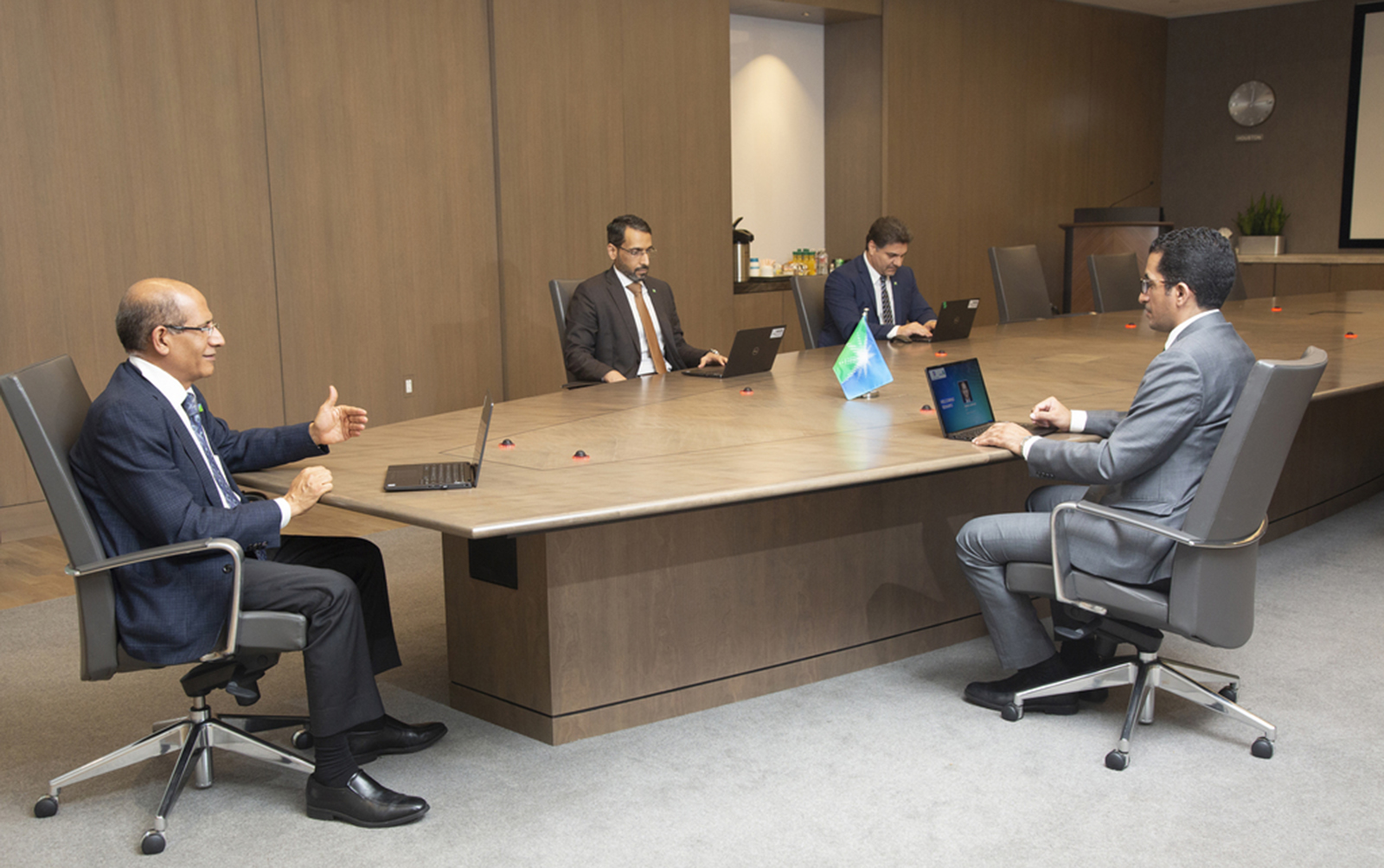Strengthening U.S.-Saudi partnerships in a post-COVID world

Nabeel I. AlAfaleg, Aramco Americas President & CEO, provided welcoming remarks on day two of the forum. He is pictured at the Aramco Americas headquarters along with members of the Procurement & Supply Chain Management (P&SCM) team, (clockwise): Adel AlShahrani, P&SCM manager; Sameer Yousef, supervisor; Strategic Sourcing; and Bader Al-Harbi, head of Procurement.
In looking ahead to a post-COVID world, energy leaders from the U.S. and Saudi Arabia convened virtually in early December to share their vision for the energy economy and a changed world.
The U.S. Chamber of Commerce hosted the event to provide a platform to discuss commercial partnerships between the two countries — especially opportunities to do business with Aramco and further invest in the Kingdom.
Aramco president and CEO Amin Nasser and senior vice president of Downstream, Mohammed Y. Al Qahtani, were featured speakers, along with other Aramco and Aramco Americas representatives. Rounding out the program, top executives from U.S. energy majors and government officials also presented their views on a post-COVID economy and energy outlook.
U.S. Ambassador to the Kingdom of Saudi Arabia, the Honorable John Abizaid participated in a virtual “fireside chat.” He talked about the unprecedented economic transformation that he is witnessing across the Kingdom — in energy and all sectors — a clear sign, he remarked, of the success so far of the Kingdom's Vision 2030.
More than 700 invited guests linked into the forum, with representatives from companies — small, medium, and large — seeking business opportunities and wanting to know how to get involved.
'Brighter days ahead'
Nasser provided welcoming remarks on day one of the forum, along with U.S. Chamber of Commerce CEO Tom Donohue. They both acknowledged the challenge this year has been, and further agreed that they expect brighter days ahead.
Nasser noted, “I believe we can now see more light at the end of the tunnel. And this means we must think about — and prepare for — a post- COVID world. The positive side of this year is that it has made us even more agile and adaptable. These are the qualities of resilience that define us at Aramco and that we see in our American partners.”
Nasser provided an overview of the historic ties between the two countries, dating back to 1933 with the signing of a concession to explore for oil in the Kingdom and the eventual formation of Aramco. “We want to build on the deep-rooted ties between Aramco and America to grow and also explore new opportunities.”
“Right now,” Nasser said, “America's businesses and service providers will find more opportunity in Saudi Arabia than at any other time in our history, on a scale that has never been seen before.”
Companies also have the opportunity to establish a presence in Saudi Arabia, through participation in the In-Kingdom Total Value Add (iktva) localization program.
Aramco's investments in the Americas, include the wholly owned Motiva refinery in Port Arthur, Texas; a majority stake in SABIC; the Aramco R&D centers in Houston, Boston, and Detroit; and the sponsored student programs at U.S. colleges and universities.
Americans and Saudis are continuing to work side-by-side, he said, strengthening ties and promoting energy sustainability.
Panel Discussion: 'Future of Global Energy Markets'
Al Qahtani served as a panelist to discuss the future of global energy markets, along with the chairman and CEO of Sempra Energy, Jeffrey Martin; and president, Regions and Corporate Affairs for Bechtel, Ambassador Stu Jones.
“COVID is still the most urgent issue on the international scale,” Al Qahtani said in his opening remarks, “and it is impacting everybody, all industries. Our industry, energy, is no different. However, with implementation of new vaccines and therapeutics, the world should see global markets continue to rebound, and especially so in the energy sector.”
Al Qahtani joined the other panelists in looking at the future global energy mix, climate change and sustainability. He said industry experts predict that oil will continue to dominate the mix — because it is still the most affordable and accessible energy source, especially in developing countries.
He talked about Aramco's efforts so far to make oil cleaner and more efficient, through strategic partnerships in R&D, technology creation and innovative thinking.
“Our upstream business is now recognized for having one of the lowest carbon intensities in the world,” he said. “And we are continuing to drive down emissions.”
Al Qahtani joined with the other panelists in emphasizing the growing importance of natural gas and LNG in the energy mix — and the need to continue working on renewables, to make them more adaptable and cost competitive.
Developing win-win partnerships
Nabeel I. AlAfaleg, Aramco Americas president and CEO, provided welcoming remarks on day two of the forum, along with Ahmed Abuzinadah, Commercial Attaché, Royal Embassy of Saudi Arabia in Washington, D.C.; and Khush Choksy, senior vice president for Middle East Affairs, U.S. Chamber of Commerce.
All three acknowledged the historic Saudi-U.S. ties and the timely opportunities to invest in win-win partnerships. AlAfaleg commended the U.S. Chamber of Commerce for its unwavering support “not only to U.S. commerce but to global commerce — and the special relationship, we at Aramco, enjoy with the Chamber.”
AlAfaleg highlighted the opportunities available for American businesses, saying that Aramco is sourcing a wide range of materials to support its oil and gas operations throughout the value chain, as well as its mega-projects.
Participants were encouraged to visit iktva.sa to learn more about the program, and also visit americas.aramco.com to view the sourcing list and register to become a qualified supplier.



